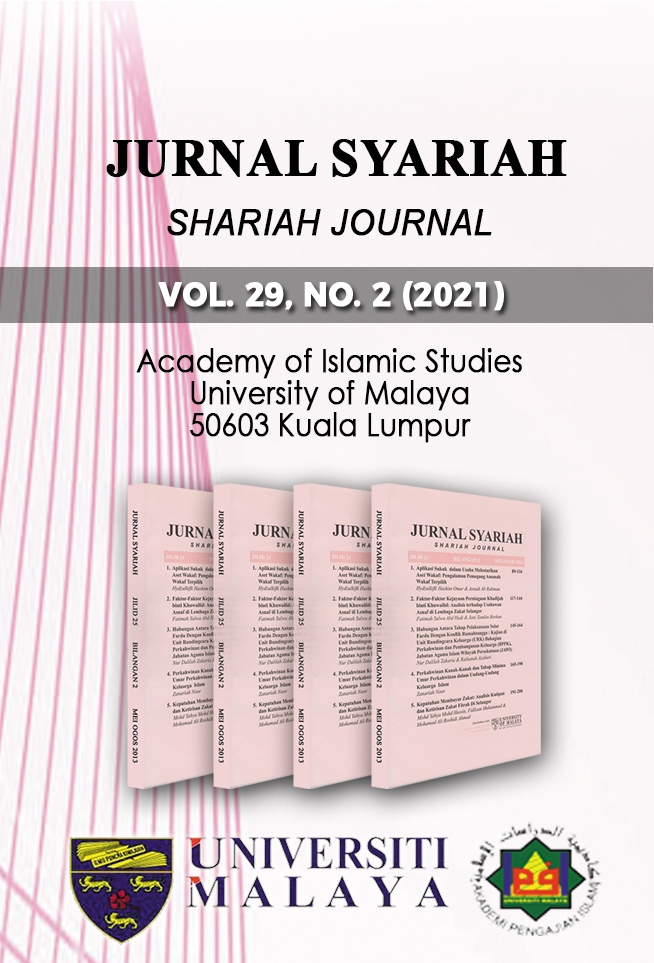CONCEPTS AND BASIS OF INTERNATIONAL RELATIONS IN ISLAMIC GOVERNMENT PERSPECTIVE
DOI:
https://doi.org/10.22452/js.vol29no2.4Keywords:
concepts, international relations, Islamic GovernanceAbstract
After the Muslims spread Islam throughout the universe, the contact of the Muslims with the a‘jam nations had entered a new chapter in international relations. Territorial boundaries displayed in plain sight do not make Muslims limit themselves in interactions between countries. The relationship between Muslims and other nations is inspired by the teachings of Islam itself, which requires Muslims always to maintain peace between Muslims and internal and external Muslims. Islam has laid the foundation of peace in international relations with one main stipulation that Muslims are not allowed even to interfere in the internal affairs of other nations. The methodology used in this research is to use a literature review approach, namely reviewing the literature related to this research. The purpose of this study is to reveal how Islam regulates relations with non-Muslims, both in the territory of Islam and with the region of non-Muslims, as exemplified by the Prophet Muhammad how he established links with the Quraish infidels through the Hudaybiyah agreement and with the other unbelievers such as the agreement contained in the Medina Charter. The results of this study revealed that since the time of the Prophet Muhammad, SAW had taught to have good relations with other nations, and it was passed on by the companions of the Prophet, even regarding today how each country should maintain good relations with other countries and of course it can be profitable for both countries.
Downloads
References
‘Abd al-Shāfī Muḥammad ‘Abd al-Laṭīf, al-Sirah al-Nabawiyah wa al-Tarīkh al-Islāmī (Miṣr: Dār al-Salām, 1428).
‘Abd al-Wahhāb Khalaf, al-Siyāsah al-Sharī‘ah (Qāhirah: Dār al-Anṣār, 1977).
‘Alī Ibn ‘Abd al-Raziq, al-Islām wa Uṣūl al-Ḥukm (Miṣr: n.p., 1926).
Al-‘Asqalānī, Shihāb al-Dīn Aḥmad Ibn ‘Alī Ibn Ḥajar, al-Iṣābah fī Tamayyiz al-Ṣaḥābah, ed. Shaykh ‘Adīl Aḥmad ‘Abd al-Mawjūd, et al. (Lebanon: Dār al-Kutub al-‘Ilmiyyah, 1995).
A. Rahman Zainuddin, Kekuasaan dan Negara: Pemikiran Politik Ibn Khaldun (Jakarta: Gramedia Pustaka Utama, 1992).
Abū ‘Amrū Khalīfah bin Khayyāt, Tārikh Khalīfah bin Khayyāth, ed. Akram Ḍiyā’ al-‘Umarī (Bayrūt: Dār al-Qalam, 1397).
Afsal al-Rahman, Muhammad as Military Leader, trans. Anas Siddik (Jakarta: Bumi Aksara, 1991).
Aḥmad Ibrāhim al-Sharīf, Dawlah al-Rasūl fī al-Madīnah (Kuwayt: Dār al-Bayān, 1972).
Ahmad Syalabiy al-Mujtama’, al-Islami, trans. Muhtar Yahya (Surabaya: Ahmad Nubhan, 2002).
Ahmad Warson al-Munawwir, Kamus Terlengkap Arab Indonesia (Surabaya: Pustaka Progressif, 1987).
Ali Bulac, ‘The Madina Document,’ in Liberal Islam: A Sourcebook, ed. Charles Kurzman (New York: Oxford University Press, 1998).
Binnaz Toprak, Islam dan Perkembangan Politik di Turki (Yogyakarta: Tiara Wacana, 1999).
Charles A. Mc Alland, Theory and The International System, trans. Mien Joebhār & lshak Zahir (Jakarta: Rajawali, n.d.).
Departemen Pendidikan Nasional, Kamus Besar Bahasa Indonesia, 3rd ed. (Jakarta: Balai Pustaka, 2005).
Faisal Ismail, Dinamika Kerukunan Antar Umat Beragama (Bandung: Rosdakarya, 2014).
Fu’ad ‘Abd al-Baqī, Mu‘jam Mufakhras li Alfāẓ al-Qur’ān (Bayrūt: Dār al-Fikr, n.d.).
H.A.R. Gibb, Islam A Historical Survey (London: Oxford University Press, 1978).
Ḥafīẓ Aḥmad, al-Idārah fī ‘Aṣr al-Rasūl (Miṣr: Dār al-Salām IIIT, 2000).
Hamka, Islam: Revolusi Ideologi dan Keadilan Sosial (Jakarta: Pustaka Panjimas, 1984).
Ibn Fāris, Abū Ḥusayn Aḥmad Ibn Zakariyā, Mu‘jam Maqāyis al-Lughah, vol. 3 (n.p.: Muṣṭafā al-Bābī al-Ḥalābī, 1971).
Ibn Fāris, Abū Ḥusayn Aḥmad Ibn Zakariyā, Mu‘jam Maqāyis al-Lughah (Bayrūt: Dār al-Fikr, n.d.).
Ibn Hishām, Sīrah al-Nabī Ṣallallahu ‘Alayh wa Sallam, vol. 2 (Qāhirah: Dār al-Fikr, 1981).
Ibn Manẓūr, Lisān al-‘Arab (Bayrūt: Dār al-Ṣādir, 1968).
J.G. Starke, Introduction to International Law, 8th ed. (London: Butterworths, 1977).
Joachim Wach, Sociology of Religion (London: The University of Chicago Press Ltd, 1971).
Khalil Abdul Karim, Hegemony Qurasiy; Agama, Budaya, Kekuasaan, trans. M. Faisol Fatawi (Yogyakarta: LkiS, 2002).
M. Mukhsin Jamil, Mengelola Konflik Membangun Damai (Semarang: Walisongo Media Center, 2015).
Mahmud Yunus, Kamus Arab-Indonesia (n.p.: n.p., n.d.).
Muḥammad Abū Zahrah, al-Alaqāt al-Dawliyyat fī al-Islām, trans. Muhammad Zein Hasan (Jakarta: Bulan Bintang, 1973).
Muḥammad bin Jarīr bin Kathīr al-Ṭabarī, Tarīkh al-Rusūl wa al-Mulūk, vol. 2 (Bayrūt: Dār al-Turāth, 1387).
Muḥammad Ḥabas, al-Islām wa al-Diplumasiyyah: Qirā’ah fī al-Qim al-Diplumasiyyah fī al Islām (Arabiya: Aspir Printing Press, 2013).
Muhammad Husayn Haikal, Hayaat Muhammad, trans. Ali Audah (Jakarta: Pustaka Litera Antar Nusa, 1994).
Muin Salim, Kekuasaan Politik dalam al-Quran (Jakarta: IAIN Syarif Hidayatullah, 1989).
Mun’im Sirry, Kontroversi Islam Awal: Antara Mazhab Tradisionalis dan Revisionalis (Bandung: Mizan, 2013).
Munawir Syadzali, Islam dan Tata Negara: Ajaran Sejarah dan Pemikiran (Jakarta: Universitas Indonesia Press, 1990).
Mūsā Shahhin al-Ashin, Fatḥ al-Mun‘im Sharḥ Ṣaḥīḥ Muslim (Miṣr: Dār al-Shuruq, 2002).
Norcholis Majid, Kaki Langit Peradaban Islam (Jakarta: Paramadina, 1997).
Robert Jackson & Georg Sorensen, Pengantar Studi Hubungan Internasional, trans. Dadan Suryaputra (Yogyakarta: Pustaka Pelajar, 2005).
Sted Mahmudun Nasir, Islam Its Concepts & History (New Delhi: Kitab Bhavan, 1981).
Sulaymān al-Ruhaylī, al-Sifarāt al-Islāmiyyah ilā Bilād Bizantiyyah (Riyāḍ: Maktabah al-Tawbah, 1414H).
W. Montgemeri Watt, Islam and The Integration of Society (London: Routledge & Kegan Paul Ltd, 1970).
Downloads
Published
How to Cite
Issue
Section
License

This work is licensed under a Creative Commons Attribution-NonCommercial 4.0 International License.
COPYRIGHT: All rights reserved. Not allowed to be reproduced any part of articles and contents of this journal in any form or by any way, whether electronic, mechanical, photocopying, recording or otherwise without permission in writing from the Chief Editor, Jurnal Syariah.











